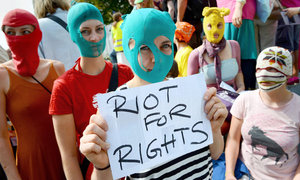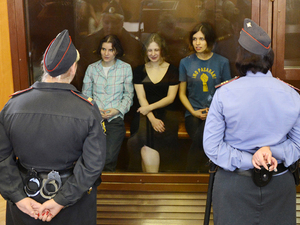Pussy Riot
The name helps. It's its own form of culture jam, a savvy reference to feminist and musical history -- riot grrrl and Susie Bright, as well as a wink to women's appropriation of sexual agency and bodily power. Madonna has worn Pussy Riot's name on her bare skin, a statement both of her support and of her own rebelliousness. (She still knows how to flaunt it.)
The inevitable aesthetic judgment has found these girls, as they sometimes refer to themselves, on the right side of cool. For women identified with rock 'n' roll -- and for fans, especially in the West -- Pussy Riot is expertly constructed, perfectly charged. Plus, it's fun to say -- unless you're in American network news, which has been demurely referring to the group as an all-female punk band.
But for artists and activists around the world the recent travails of Pussy Riot, founded in 2011, have become a cause célèbre. When its members, Maria Alyokhina, Yekaterina Samutsevich and Nadezhda Tolokonnikova, were sentenced on Aug. 17 to two years each in a prison camp for staging a flash protest against President Vladimir V. Putin in Moscow's main Orthodox cathedral in February, it served as another rallying point, at a time when many are concerned with government malfeasance, economic and social equality, and, not incidentally, women's rights. The ladies of Pussy Riot are of-the-moment renegades.
That the group is so digestible to Western audiences has been much noted. Yes, the choppy performance that got its members arrested could have just as easily taken place at an undergrad art school, where the corresponding video might've been mocked for its low production value (or turned up in a flashback episode of HBO's "Girls"). Instead, when it made the rounds online, it found eager and sympathetic spectators and an instant distribution channel aided by social media. Punk was never shy about being amateur; DIY spread wide is its hallmark. And in a country where public dissent is at a neophyte stage, Pussy Riot's "Punk Prayer," a 40-second lip sync, only served to highlight the discordantly severe punishment its members received. Supporters -- like the hundreds who gathered at a reading in New York on the eve of the sentencing -- viewed the group members as unfairly judged, less creatively shackled musicians than oppressed symbols of heroism.
The Russian response to Ms. Alyokhina, 24; Ms. Samutsevich, 30; and Ms. Tolokonnikova, 23, has been mixed at best. Russians are generally deeply distrustful of feminism, even though Russian women are no shrinking violets.
Yet the stoicism of Ms. Samutsevich, Ms. Alyokhina and Ms. Tolokonnikova -- the latter two, we are frequently reminded, the mothers of young children -- has made a deep impact in both Russia and the West. Their symbolism as radicals -- Ms. Tolokonnikova with her fist raised as she was led out of the courtroom -- has been so successful in the West that there is now debate not about whether to support them but on what grounds: as social agitators, or broad critics of the Kremlin. For its part the group -- along with an unofficial spokesman in Pyotr Verzilov, Ms. Tolokonnikova's husband -- has made its ambitions plain: revolution.
Members of Pussy Riot Yekaterina Samutsevich (left), Maria Alyokhina (center), and Nadezhda Tolokonnikova sit in a glass-walled cage during a court hearing in Moscow
See also Slate slideshow.

